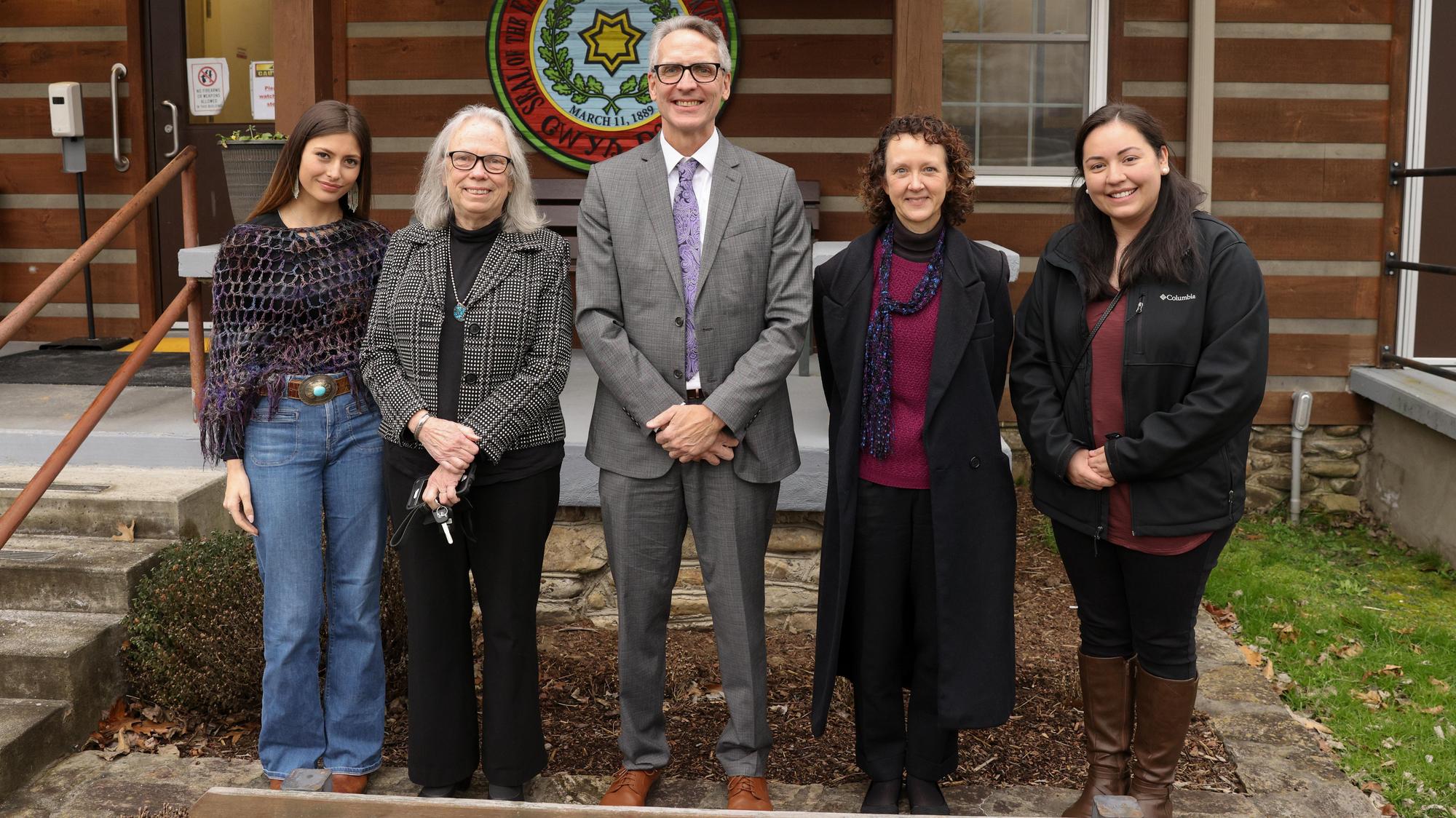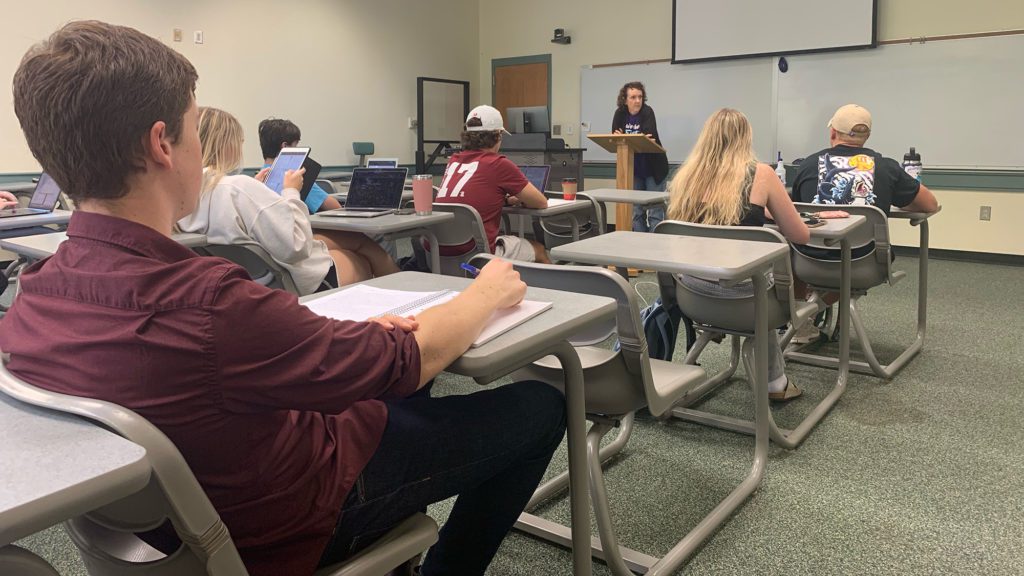Indigenous Peoples Day presents chance for engagement, acknowledgment and learning

“Long before our Alma Mater sang of the mountain river that laves ‘our mother’s’ feet, the Cherokee honored that water, the land through which it flowed, and all the creatures living on the land with them,” reads a passage in a document that Furman approved in 2019 and formally presented to the Eastern Band of Cherokee Indians earlier this year. “This Land Acknowledgement challenges us to learn from the Cherokee people and to draw from their wisdom about community, resilience and the meaning of life which this land nurtured.”
At Furman, as many in the United States observe Indigenous Peoples Day, that challenge continues as the university explores new ways to engage with Native American and indigenous cultures. And one student group has asked the university to officially recognize the holiday, which is typically the second Monday of October.

Danielle Vinson ’89, a professor of politics and international affairs, leads a discussion in her Native American Politics course. / Credit: Colin Glascott ’23
Appreciation, learning and acknowledgement
Last year, Joseph Biden became the first U.S. president to issue a proclamation on Indigenous Peoples Day, declaring Oct. 11, 2021, to be a national holiday. Currently, 16 U.S. states (South Carolina not included) celebrate the holiday in addition to or instead of Columbus Day on the second Monday of October.
A request from Furman’s Native American and Indigenous Peoples Association for the university to formally recognize Indigenous Peoples Day has been sent to the university’s calendar committee.
“We felt it was important to keep the momentum going” after the land acknowledgment, said Charlie Reiney ’23, NAIA president. “We hope that we will inspire our peers to not only appreciate and learn from indigenous communities and individuals, but also acknowledge the devastating consequences of colonialism that we continue to benefit from today.”
Although he does not share Native American heritage himself, Reiney participates with NAIA “simply as an ally,” he said. “Native American and indigenous cultures are underrepresented at our school.”
Along with advocating for the Indigenous Peoples Day holiday, NAIA is planning several events, including a trip to the Cherokee reservation and museum in western North Carolina, hosting Native American speakers and artists on campus, and fundraising, said Reiney.
NAIA member Krista Colbert ’24, a transfer student from New Jersey who is part of the Western Cherokee Nation, appreciates that her new school is further exposing her to Native American history and culture.
“It is essential for us to be knowledgeable about the land we are living on and using,” she said. “I feel more connected and have been enjoying learning so many new aspects of the different tribes.”
“Learning about any culture other than your own can only enrich your life more,” said Ahnawake DeCosty ’25, a member of the Caddo Nation who helped draft the NAIA request. “Learning about Native American and indigenous people specifically can help students understand more fully the grounds they walk on, appreciate the respect Native Americans have had for the land and nature around us and the reverence they had for this area that supported their people prior to us.”
‘A different way of thinking’
Colbert and DeCosty have both found a mentor in Helen Lee Turner, professor of religion, who has been studying and teaching about indigenous cultures for decades.
“I feel it as a kind of calling to help students understand these cultures and understand the tragic and awful history,” said Turner, who teaches courses on Native American religion and Navajo medicine and health practices. “We need to know about a history that involves genocide on our own land. Most students know a little bit about the Trail of Tears, but when they get in my class, they find out it was so much worse than they knew.”
But there are also many positive and affirming lessons from Native American culture, Turner said.
“We need to know the way most native people think, because it’s very different from ours,” she said. “It’s far less individualistic and much more conscious of the environment. It’s a different way of thinking about government. These people are very attached to place for their religious and cultural values.”
Turner is currently planning a course on the Cherokee, and she has been discussing other potential topics with her colleagues, including public health, archaeology and history, as well as a possible minor in Native American studies.
Not just a historical issue
For several years, Turner has also led a May Experience course, Indian Country: Indigenous Culture and Religion in the Southwest, which visits Hopi, Pueblo and Navajo reservations in Arizona and New Mexico. In 2023, she will lead the trip with Danielle Vinson ’89, a professor of politics and international affairs.
In Fall 2022, Vinson launched a special topics course on Native American politics, covering not only the governments of individual tribes but also how the United States government has interacted with them. Her students are mostly new to the subject, she said, and they soon find that it does not fit easily within the liberal-conservative spectrum.
“They can’t process the information through their normal framework, so I can literally see them thinking through things in class,” said Vinson, who also attended the land acknowledgement presentation in Cherokee earlier this year. “It allows them to see different ways of thinking about government and provides with them with new critiques of their own government. The comment I’ve heard many times in class is, ‘Why have I never learned this before?’”
For Caitlin Duffy ’25, Native American Politics is her favorite class this semester.
“It’s helped me gain more of an insight into the issues that indigenous peoples face today,” she said. “It’s not a solely historical issue.”